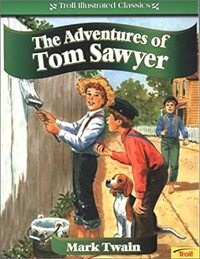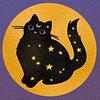You need to sign in or sign up before continuing.
Take a photo of a barcode or cover
How do you rate an American classic? I’m purposely not assigning stars here because I don’t know how to answer that question, especially with a text that has become fraught with racial angst, and I confess it was a tough go to start with. Even if I hadn’t flinched every time I read the n-word, the humor seemed juvenile and the rendering of dialect dated and difficult. On the other hand, I enjoyed the descriptions of the Mississippi and felt Huck’s pleasure in its beauty -- Mark Twain obviously loved this river and knew it well. Then, as Huck started to develop a moral sense informed by empathy rather than religious rules and social norms, the book grew on me. It wasn’t just a random series of yarns – it had a narrative arc! My affection for Huck deepened, and I even found myself chuckling out loud -- only for my pleasure to dim in the chapters about freeing Jim from captivity. Even in a work of fiction known for its satire and even accounting for a change in consciousness since it was published in 1884, it was hard to stomach Tom Sawyer’s hijinks when Jim had to pay such a high price for them.
I pulled this off my shelf as a prelude to reading James for the UCSC Deep Read this spring; I’m glad I revisited it and look forward to the perspective in Percival Everett’s novel.
I pulled this off my shelf as a prelude to reading James for the UCSC Deep Read this spring; I’m glad I revisited it and look forward to the perspective in Percival Everett’s novel.
adventurous
funny
lighthearted
medium-paced
Plot or Character Driven:
A mix
Strong character development:
Yes
Loveable characters:
Yes
Diverse cast of characters:
No
Flaws of characters a main focus:
No
After reading James by Percival Everett I decided to go ahead and revisit the source material, The Adventures of Huckleberry Finn.
In Huckleberry Finn we meet Huck a 13 year old "orphan" or indigent minor. At the end of The Adventures of Tom Sawyer Huck managed to come into a lot of money. It was being kept safe for him by Judge Thatcher who was giving Huck one dollar interest payments .... Unfortunately for Huck his abusive and deadbeat father heard about the money and came looking for what he decided was his. Eventually deciding to escape the abuse Huck faked his own death and ran away. Coincidentally the slave Jim also decided to run away after hearing a rumor that he would be sold and separated from his family. In James we get the narrative from the perspective of a black slave living in the South and in Huckleberry Finn we get Hucks perspective as a young, poor, white boy.
One thing that I find interesting is that both Jim and Huck are essentially seen as invisible. While Huck is the titular character of his story he is generally on the sidelines of every scenario. The adults in his life constantly make poor moral choices as Huck battles with his own morality. Huck spends a lot of time fussing with himself about whether or not he is doing bad by helping Jim or by not turning him in. Huck struggles with the hypocrisy he faces and what he can see to be true with his eyes.
This all comes to a head in the last section where Huck is back with Tom. Huck always goes along with Tom because he looks up to him. Tom who has wanted for nothing has the luxury of imagination and treats Jims plight as a game. Because Tom didn't journey with Huck and Jim he doesn't really care either way what happens to Jim as long as Tom is having a good time. Even though Tom Sawyer knows the truth....that wouldn't be fun for him. Huck finds that he can't stand up to Tom and becomes complicit. It is truly representative of how easy it is to just fall into a pattern of not rocking the boat and not following your own mind.
I liked Huckleberry Finn but I still feel that as far as an anti-slavery narrative, James, is more about that. Huckleberry Finn is more about Hucks personal battle with right and wrong and hypocrisy. I enjoyed it for what it was though.
In Huckleberry Finn we meet Huck a 13 year old "orphan" or indigent minor. At the end of The Adventures of Tom Sawyer Huck managed to come into a lot of money. It was being kept safe for him by Judge Thatcher who was giving Huck one dollar interest payments .... Unfortunately for Huck his abusive and deadbeat father heard about the money and came looking for what he decided was his. Eventually deciding to escape the abuse Huck faked his own death and ran away. Coincidentally the slave Jim also decided to run away after hearing a rumor that he would be sold and separated from his family. In James we get the narrative from the perspective of a black slave living in the South and in Huckleberry Finn we get Hucks perspective as a young, poor, white boy.
One thing that I find interesting is that both Jim and Huck are essentially seen as invisible. While Huck is the titular character of his story he is generally on the sidelines of every scenario. The adults in his life constantly make poor moral choices as Huck battles with his own morality. Huck spends a lot of time fussing with himself about whether or not he is doing bad by helping Jim or by not turning him in. Huck struggles with the hypocrisy he faces and what he can see to be true with his eyes.
This all comes to a head in the last section where Huck is back with Tom. Huck always goes along with Tom because he looks up to him. Tom who has wanted for nothing has the luxury of imagination and treats Jims plight as a game. Because Tom didn't journey with Huck and Jim he doesn't really care either way what happens to Jim as long as Tom is having a good time. Even though Tom Sawyer knows the truth....that wouldn't be fun for him. Huck finds that he can't stand up to Tom and becomes complicit. It is truly representative of how easy it is to just fall into a pattern of not rocking the boat and not following your own mind.
I liked Huckleberry Finn but I still feel that as far as an anti-slavery narrative, James, is more about that. Huckleberry Finn is more about Hucks personal battle with right and wrong and hypocrisy. I enjoyed it for what it was though.
adventurous
medium-paced
Read this originally in high school. I chose to re-read it for context when reading James as well as Ron Chernow's biography on Mark Twain.
This book is definitely a product of it's time. I can understand why this book was popular and stood out amongst the other American literature of the times, but it doesn't quite hold up in the modern era. I found it to be quite boring and dragged on at times.
This book is definitely a product of it's time. I can understand why this book was popular and stood out amongst the other American literature of the times, but it doesn't quite hold up in the modern era. I found it to be quite boring and dragged on at times.
adventurous
emotional
funny
hopeful
lighthearted
medium-paced
adventurous
slow-paced
Plot or Character Driven:
Plot
Strong character development:
No
Loveable characters:
No
Diverse cast of characters:
Yes
Flaws of characters a main focus:
Complicated
idk it just wasnt what i thought it was gonna be. also tom sawyer is just the least likable person ever.
adventurous
emotional
funny
hopeful
lighthearted
fast-paced
Plot or Character Driven:
A mix
Strong character development:
Yes
Loveable characters:
Yes
Diverse cast of characters:
Yes
Flaws of characters a main focus:
Yes
This was one of the most emotionally rewarding pieces of literature I've ever read. The Adventures of Huckleberry Finn, unlike Tom Sawyer, is written in a first person perspective - so there is no voice-of-God narration in Twain's impeccable prose, but the Pike County English of the novel is still laced with his pitch-perfect comedic timing.
This is another book about boyhood and adventures, but it reads primarily as a critique of slavery and the social mentality of the Jim Crow south. An early chapter where Huck ponders the submissiveness of genies is a thinly-veiled allusion to the plight of slaves themselves, and his discussion with Tom Sawyer shows us that he is starting to question the things he is told to accept as datum. Without realising it, he is the more mature of the two boys by far, an observation that can be transposed to the two novels as well.
Huck's internal struggles, and eventual decision to help Jim the slave, despite the certainty of eternal damnation, gave me goosebumps. There is such a powerful message here, about the difference between what is good and what society deems to be good. So much of Huck's skewed notions of morality are derived from the interpreted word of God in the south states, and yet, his humanity wins out every time.
In a marvelous stroke of ingenuity, Twain creates two characters - the 'duke' and the 'king', who seem like grown up versions of Huck and Tom themselves. They lay about and disappoint society and are always enthusiastic about the next windfall. But in introducing us to them, he brings out the best in young Huckleberry, who is mischievous but never cruel. It's a dramatic juxtaposition that reminds us that not all scoundrels are the same, and Twain's wry illustrations of Huck's pricked conscience are both amusing and endearing.
The Adventures of Huckleberry Finn is also a wonderfully joyous novel, and Twain has the most fun when his characters spin a yarn, put on a performance and get up to hysterical antics. This is where the novel shines - it truly feels like it was written from a child's perspective, sans the cynicism that might otherwise have crept into such a story. There were a good many moments that had me laughing out loud, and the ending of the novel puts a bow on things with such good-natured sincerity that I will cherish my time with this book forever.
This is another book about boyhood and adventures, but it reads primarily as a critique of slavery and the social mentality of the Jim Crow south. An early chapter where Huck ponders the submissiveness of genies is a thinly-veiled allusion to the plight of slaves themselves, and his discussion with Tom Sawyer shows us that he is starting to question the things he is told to accept as datum. Without realising it, he is the more mature of the two boys by far, an observation that can be transposed to the two novels as well.
Huck's internal struggles, and eventual decision to help Jim the slave, despite the certainty of eternal damnation, gave me goosebumps. There is such a powerful message here, about the difference between what is good and what society deems to be good. So much of Huck's skewed notions of morality are derived from the interpreted word of God in the south states, and yet, his humanity wins out every time.
In a marvelous stroke of ingenuity, Twain creates two characters - the 'duke' and the 'king', who seem like grown up versions of Huck and Tom themselves. They lay about and disappoint society and are always enthusiastic about the next windfall. But in introducing us to them, he brings out the best in young Huckleberry, who is mischievous but never cruel. It's a dramatic juxtaposition that reminds us that not all scoundrels are the same, and Twain's wry illustrations of Huck's pricked conscience are both amusing and endearing.
The Adventures of Huckleberry Finn is also a wonderfully joyous novel, and Twain has the most fun when his characters spin a yarn, put on a performance and get up to hysterical antics. This is where the novel shines - it truly feels like it was written from a child's perspective, sans the cynicism that might otherwise have crept into such a story. There were a good many moments that had me laughing out loud, and the ending of the novel puts a bow on things with such good-natured sincerity that I will cherish my time with this book forever.
slow-paced
Plot or Character Driven:
A mix
Strong character development:
Complicated
Loveable characters:
Complicated
adventurous
challenging
dark
emotional
funny
reflective
sad
tense
medium-paced
Plot or Character Driven:
A mix
Strong character development:
Yes
Loveable characters:
Yes
Diverse cast of characters:
Yes
Flaws of characters a main focus:
Yes






